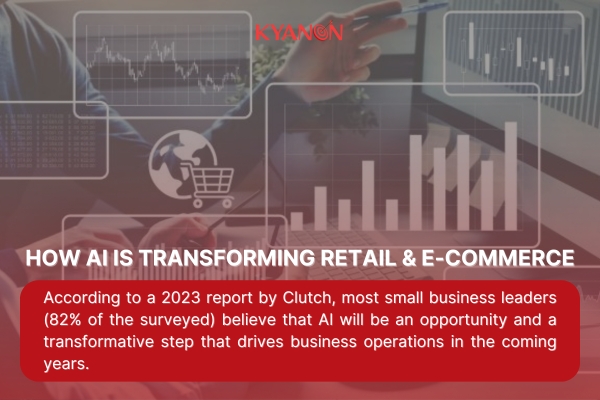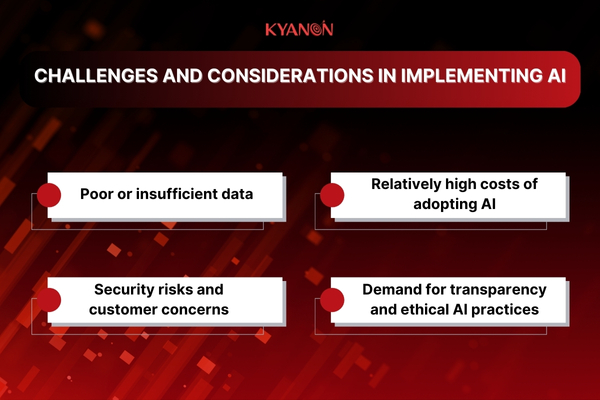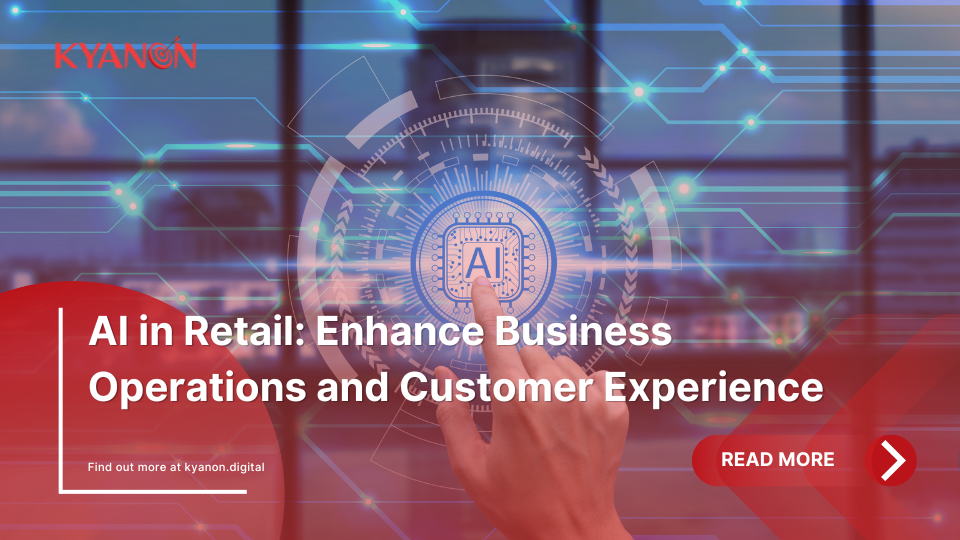AI is transforming the retail and e-commerce industries, revolutionizing business operations and customer experiences, thereby helping businesses adapt to changes.
AI in retail and e-commerce is opening a new era of transformation in the industry. It revolutionizes how businesses operate and interact with customers by enhancing sales processes, predicting shopping patterns, providing personalized experiences, and improving decision-making.
There is currently no specific research proving the impact of AI on the future of retail and e-commerce. However, automated payment systems and on-demand recommendations are among the ways AI technology is manifesting in our lives.

According to a 2023 report by Clutch, most small business leaders (82% of the surveyed) believe that AI will be an opportunity and a transformative step that drives business operations in the coming years. Therefore, it is time for companies operating in the retail or e-commerce market to recognize the significance of AI in driving their success.
1. The Development of AI in Retail and E-commerce
AI technology has revolutionized the e-commerce industry and significantly impacted online shopping trends. With AI-powered algorithms, retailers can analyze customer preferences and behaviors to provide suitable and personalized product recommendations. Personalization ensures that each customer receives recommendations aligned with their preferences, thus increasing the likelihood of purchases.
Moreover, AI-driven chatbots and virtual assistants enable businesses to assist customers quickly and accurately. Chatbots can handle various requests, from product inquiries to order tracking. This not only saves time for both customers and businesses but also enhances their customer satisfaction.

Furthermore, AI-supported predictive analytics helps businesses anticipate customer demand and outpace their competitors. By analyzing customer data, market trends, and past purchasing patterns, retailers can make data-driven decisions to optimize inventory management and marketing campaigns.
This proactive approach allows retail and e-commerce businesses to meet customer expectations and provide a seamless shopping experience.
AI facilitates smoother online and in-store shopping experiences, delivering an enjoyable shopping journey. Digital commerce innovation offers customers personalized and engaging experiences, addressing the evolving needs of consumers.
- Online Ordering, In-Store Pickup
- Consistent experience across platforms.
As technology continues to evolve, AI in retail is not just an expectation but plays a significant role in the shopping experience, merging the best aspects of online and in-store shopping into a seamless whole.
2. Personalizing the Shopping Experience with AI
The foundation of any successful business lies in its ability to deliver exceptional customer experiences. This is what makes companies using AI in retail standing out in a crowded market, helping foster long-lasting connections with their customers.
In fact, 65% of leaders experience the AI personalization process in retail and view AI as an indispensable tool for enhancing engagement and gaining a competitive edge.
With the emergence of creative AI, businesses are now equipped to offer highly personalized experiences that leave a lasting impression on customers. These sophisticated AI tools revolutionize brands and effectively serve their customers.

By actively applying AI personalization processes in retail, businesses can:
- Enhance product usability
- Streamline the entire customer journey
- Increase cost savings
- Build trust and improve customer experiences.
3. AI in Inventory Management and Supply Chain
Businesses continually seek solutions to gain advantages and improve operations. AI has become a powerful assistant in providing innovative solutions to the challenges of maintaining and developing sustainable inventory management.
AI is not a single, monolithic technology but a suite of capabilities that enable machines to mimic human intelligence, including learning from data, making predictions, and automating tasks.

AI can enhance various areas of inventory management, from real-time data analysis to automated decision-making. It can process vast amounts of data quickly and accurately, making it an invaluable tool for optimizing inventory.
AI-driven inventory management technology is applied across various industries, from retail, e-commerce to manufacturing and logistics:
- Retail: AI-supported retail inventory systems help predict consumer demand, allowing businesses to maintain optimal stock levels and avoid overstocking or stockouts.
- Manufacturing: AI can enhance production planning by optimizing the supply of raw materials and components.
- Logistics: AI can streamline routing, helping to save costs and ensure timely deliveries.
4. Virtual Assistants and Chatbots for Customer Service
AI-powered chatbots are driving innovation in customer support, providing the instant, 24/7 assistance that modern consumers expect. Equipped with natural language processing capabilities, chatbots can handle many simple queries, enabling businesses to focus on resolving more complex issues.
According to G2, 68% of customers appreciate the response speed of chatbots, highlighting the importance of immediate support in achieving customer satisfaction.

Integrating these AI solutions with existing systems provides benefits such as:
- Cost savings
- Consistent customer experiences, maintaining and enhancing customer trust and loyalty
- Improved customer experience.
AI is making a significant impact in retail thanks to its potential to personalize retail experiences while meeting customer needs. Technologies like computer vision, natural language processing, and chatbots are being deployed in the retail sector.
5. AI in Visual Search and Product Discovery
AI-based search identifies objects, colors, styles, and brands in images, improving search accuracy and efficiency.
- Pattern recognition: Identifies textures, shapes, and forms.
- Machine learning: Enhances accuracy through exposure to image datasets.
- Contextual evaluation: Understands relationships between objects.

Accurate component detection helps bridge the gap between visual inspiration and product discovery, making searches more streamlined and personalized. It also ensures that each shopper’s journey is as unique as their preferences.
AI connects user intent with similar products, enriching the shopping experience through customization, speed, and better choices. AI ensures recommendations align with personal preferences, reducing search time and providing diverse options.
6. AI and Dynamic Pricing
Dynamic pricing, also known as surge pricing, demand-based pricing, or time-based pricing, is a strategy that allows companies to change prices based on current market demand.
AI enhances this strategy by analyzing massive data sets to predict demand fluctuations, understand customer price sensitivity, and determine optimal prices that maximize revenue or market share.
AI models used for dynamic pricing rely on machine learning algorithms that continuously learn from market data, consumer purchasing patterns, competitor pricing, and even social media trends. These models can forecast demand for products or services under various scenarios and adjust prices in real-time to align with their predictions.

Using AI not only enhances pricing adjustment efficiency but also delivers a level of accuracy that previous manual analysis methods could not achieve, for example:
- Maximizing revenue: By optimizing pricing, companies can capture maximum willingness to pay during peak demand times and adjust prices to maintain sales during low periods.
- Enhancing competitiveness: Ensures that company products remain competitively priced and respond promptly to market changes compared to the competitors.
- Improving customer segmentation: AI algorithms can identify different customer segments and adjust prices for each segment, maximizing revenue and customer satisfaction.
- Optimizing inventory management: Dynamic pricing helps manage inventory more effectively, reducing stockouts during high demand and avoiding overstocking during low periods.
7. The role of AI in enhancing customer experience
In addition to providing companies with close insights into customer needs, thereby increasing satisfaction through specific actions, AI can also impact the retail market by identifying opportunities for automation, improving supply chain efficiency, and optimizing data-driven decisions.
Stephanie Dsouza, Director of Growth Marketing at Virtual Gurus, a virtual support company, expresses: “One of the main advantages of AI is its ability to process and analyze vast amounts of data at incredible speeds. This allows AI systems to identify patterns, make predictions, and provide valuable insights to support decision-making.”

AI operations in retail and e-commerce enable retailers to deliver customized experiences for customers by providing personalized solutions with chatbots and virtual support. For example, Amazon Go, the retail chain of the e-commerce giant Amazon, enhances customer satisfaction by allowing customers to simply pick what they want and walk out. The advanced sales process helps businesses collect customer data, improve sales processes, and increase engagement.
Some retail markets today, such as Walmart, are implementing various AI tools in stores and warehouses to allow employees to interact more with shoppers.
Onur Kultubay, CEO of YouParcel, a distribution and shipping business, also states: “YouParcel has harnessed the power of AI to optimize logistics and supply chain management, ensuring efficient resource allocation and timely deliveries.”
8. Challenges and considerations in implementing AI
AI promises to transform the retail and e-commerce industries by helping personalize the customer journey, creating rich experiences, and streamlining core functions.
However, to effectively implement AI technology, businesses face challenges and obstacles, including:
- Poor or insufficient data
- Relatively high costs of adopting AI for small businesses
- Security risks and customer concerns regarding AI
- Demand for transparency and ethical AI practices in retail and e-commerce.

9. The Future of AI in Retail and E-commerce
The development of AI will continue to transform the retail and e-commerce industries by driving innovation, personalization, and shaping the future of shopping in unprecedented ways. By embracing AI technologies, businesses can gain a competitive edge and thrive in an ever-changing digital landscape. Companies should consider the focus of their future AI applications as these technologies continue to evolve.
Kyanon Digital is a leading provider of AI and Retail solutions in Vietnam, specializing in innovative technologies that transform business operations and enhance customer experiences. With expertise in AI-driven strategies and implementation, Kyanon Digital team help businesses unlock their full potential. Contact Kyanon Digital today for expert consultation and seamless AI implementation tailored to your needs.


